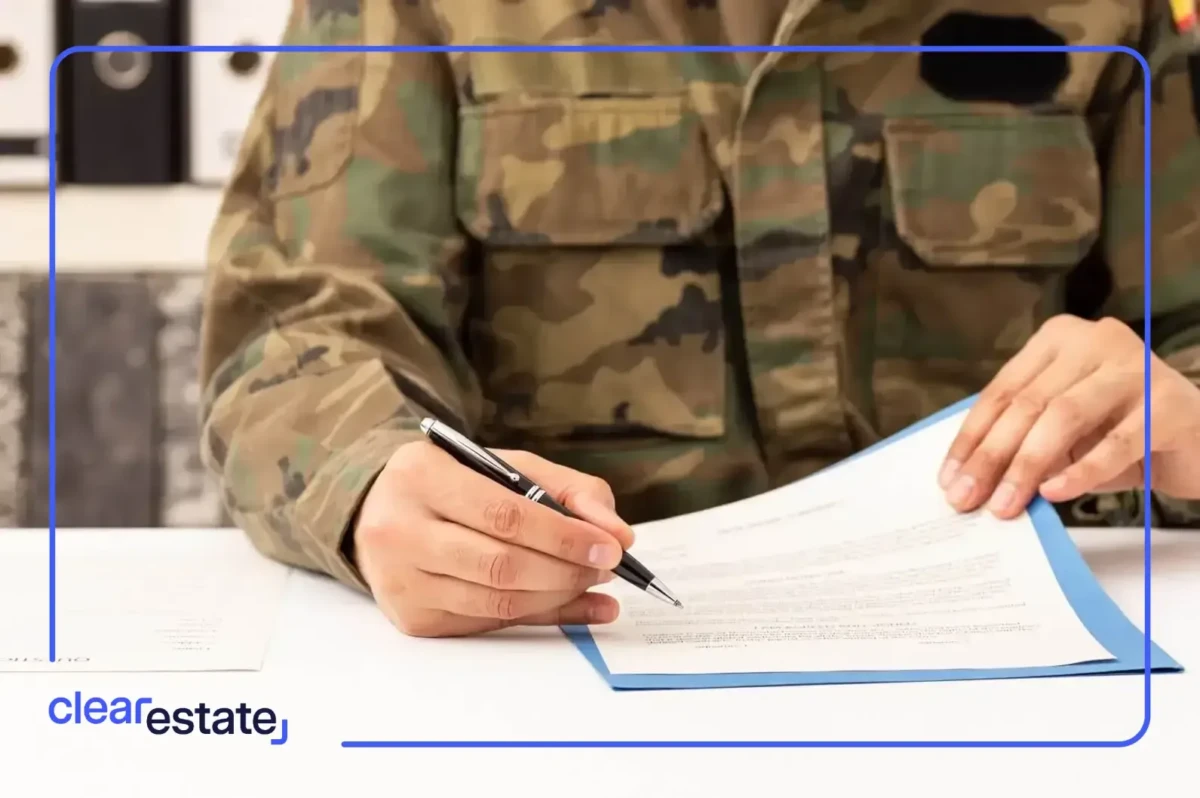Estate Planning
Oct 27, 2025
Introducing Empathy to Estate Bureaucracy
ClearEstate’s origin story: how grief, inefficiency, and compassion inspired Alex to build a fintech that brings empathy and efficiency to estate planning and settlement
For military members, proper estate planning needs to include specific military benefits. Read on to find out more.


Estate planning is essential to keeping your assets protected after you pass, and ensuring that your loved ones are taken care of when you’re no longer there. For individuals in the military, this process is even more critical. This is because there are certain issues that military families need to take into account when creating an estate plan. From your living situation to your marital status, there is no shortage of factors to consider while you set up your plan.
If creating a military estate plan in California seems overwhelming to you, it helps to know what you can expect from the process. Here are some of the main factors to think about while you design your customized plan.
We regularly share relevant information about wills and estates.
No two people have the same needs, which is why it's vital to create an estate plan that reflects your own goals. To ensure that your plan aligns with your needs and desires, it's important to consider several key factors. Below are several important questions that you should ask yourself during the estate planning process.
Your answer to each of these questions will help inform your overall plan. Some of these points are especially relevant to members of the military, who may find themselves moving around a lot. If you know that you won't be staying in the same place for more than a few years at a time, be sure to take note of this when writing your will. In order to know more about the best estate planning tips, check out this guide.
There are numerous types of benefits that military members and their beneficiaries can receive. Some of these include the following:
Also known more broadly as Veteran Benefits, VA Pension is available to service members after they have separated from the military. There is no minimum length of service required to qualify for VA Pension, and it is not necessary to have had a full military career to enjoy this benefit.
Veteran Benefits cover a wide range of services, including education, healthcare, financial compensation for service-related injuries and illnesses, and financial aid intended to cover the rising costs of extended personal and medical care.
Once a veteran passes, their surviving spouse and any unmarried dependent children may be eligible for a Survivors Pension, as long as the surviving spouse meets certain income requirements and hasn’t remarried. An active military member’s family may also be eligible for Dependency and Indemnity Compensation (DIC) if the military member died in the line of duty. A solid military estate plan should include speaking to family members about these options and ensuring that they know how to apply for those benefits, should the time come.
The Thrift Savings Plan is a retirement account in the same spirit as a 401(k), except that it’s only available for federal employees and members of the armed services. Similar to other investment-based retirement vehicles, you’re able to name beneficiaries on your Thrift Savings Plan, and should in fact do that as soon as possible. Beneficiaries inherit the account when the original account holder passes away, and a beneficiary can be one or more persons, a trust, a corporation, or a foundation or charity. By naming beneficiaries on the account, you’ll be able to bypass probate for the assets in the account, thereby saving your loved ones a lot of time and energy.
When determining the value of the estate, it's crucial to factor life insurance into the equation. Military benefits aim to provide the support that you need during this step. Service Members' Life Insurance Group, a division of the U.S. Department of Veteran Affairs, offers life insurance at a reduced cost for active-duty members and their loved ones.
Be sure to factor this low-cost insurance into your overall estate plan. This will help provide you with the peace of mind that you need during the estate planning process.
Your final will and testament should address three main areas:
The second component of this category is known as a trust. A trust is a legal entity that contains property and assets that specified individuals will benefit from. By creating a trust and placing your estate’s assets in the trust, you can minimize the size of the estate and potentially reduce the need for probate. Whether you think you would benefit from a will or a trust-centered plan, be sure to carefully review all of your options to make the best decision for you and your family.
For those who want to cover all their bases, creating a power of attorney to ensure someone can make financial and legal decisions on your behalf if you’re incapacitated may be a wise move. Life can be unpredictable, and having the security of knowing that your spouse or someone else who you wholeheartedly trust has your back and will make the best decisions for you, your estate, and your beneficiaries if you’re unable to do so can be invaluable.
Be sure to keep these points in mind when creating a military estate plan in California. To get the most out of the process, consider reaching out to a skilled expert like ClearEstate. With just a little bit of extra assistance, you can navigate the estate planning process with greater confidence and peace of mind.